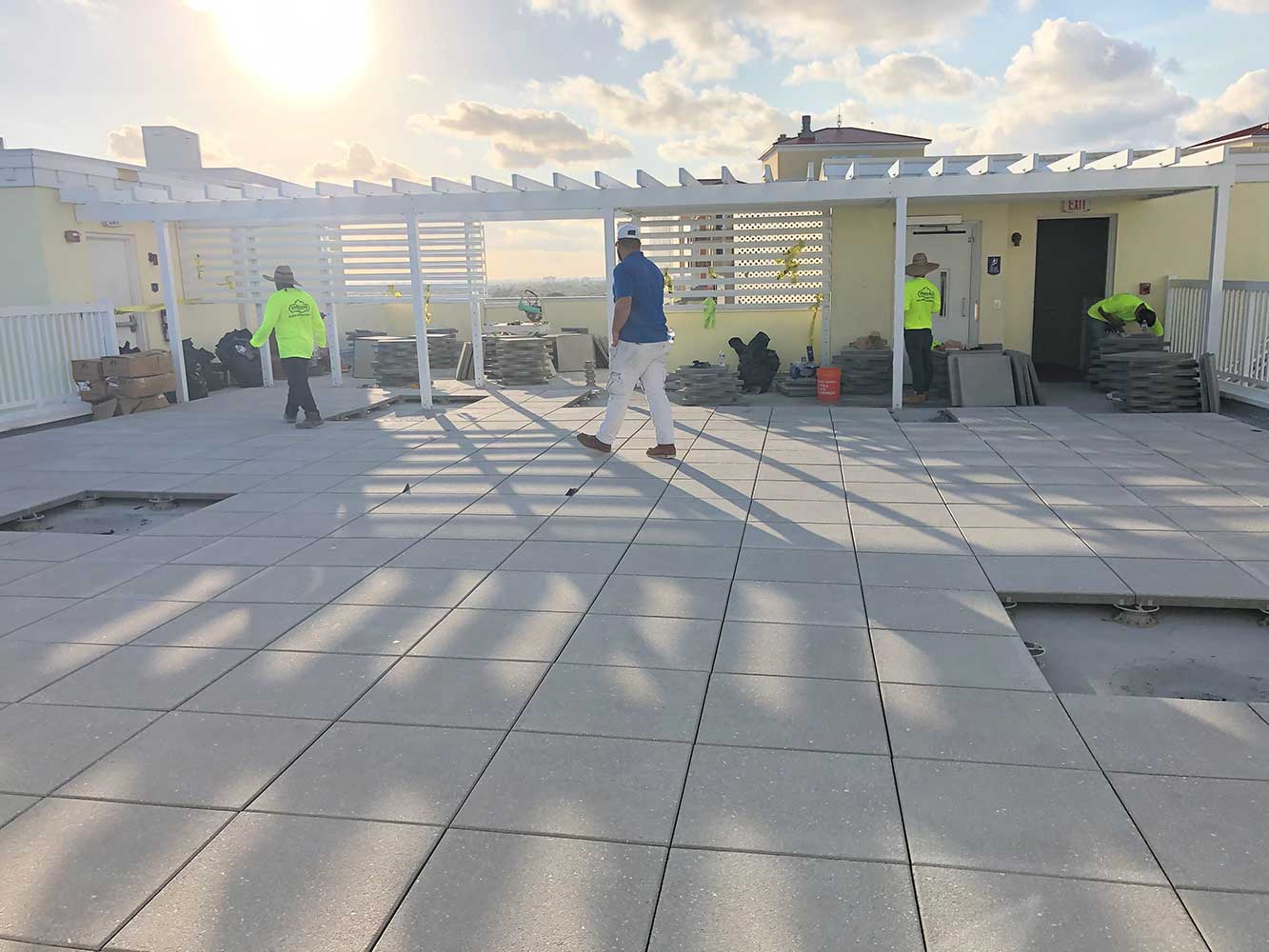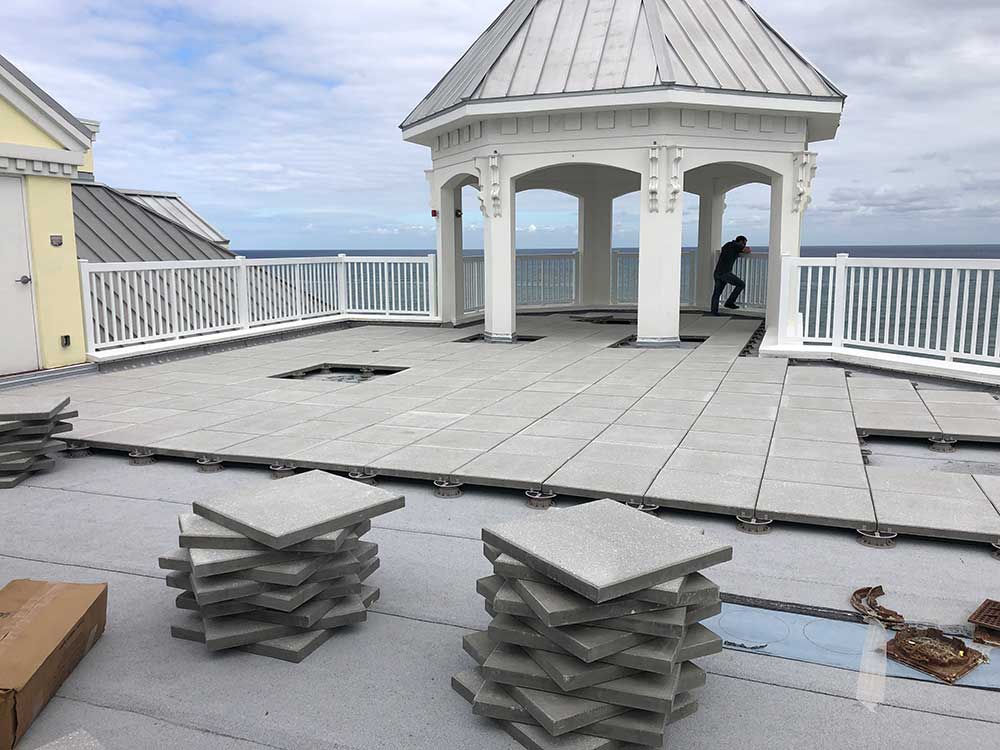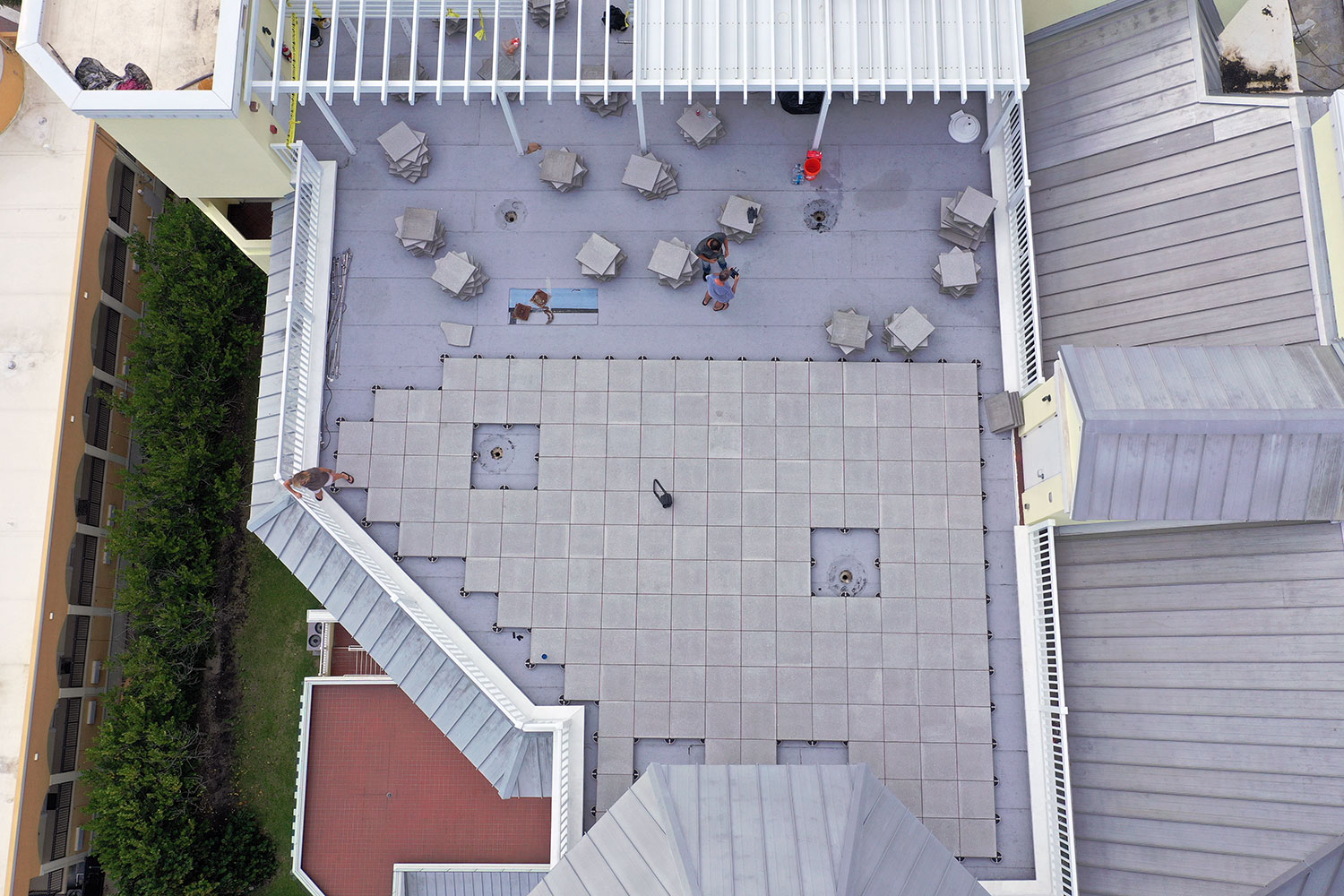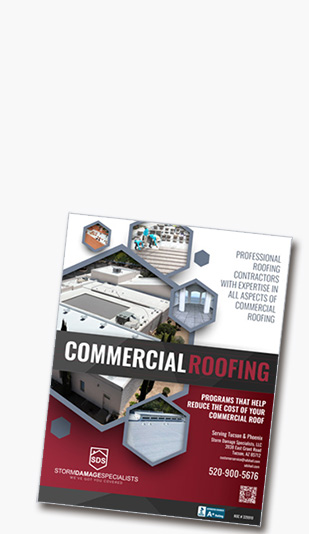Paver and pedestal roofs are becoming increasingly popular for commercial building projects. The combination of looks, functionality, and efficiency make them an excellent choice for a variety of commercial applications. In this article, we’ll explore the paver and pedestal roofs and why they may be a perfect choice for a roof deck for your building.
What is a pedestal paver system?
In short, paver and pedestal roofs are rooftop systems consisting of a layer of pavers placed on top of adjustable pedestals anchored onto a substructure. The substructure elevates the paver and pedestal system above the roofing membrane, providing insulation and drainage. One of the most common uses for a pedestal deck system is to create level rooftop decks over a waterproof roof membrane.
Concrete and porcelain pedestals can transform lost space, enabling roofs to achieve maximum style and function. In addition, this innovative approach allows uneven roofs to lay level to create new possibilities and options for our rooftop spaces. A pedestal-paver roofing system can convert a simple “keep the water out” structure to usable space.
Pedestals for rooftop decks and more
 Pedestal paver systems are the best way to build elevated decks, roof terraces, and plaza decks on sloped roofs or where you cannot install a permanent structure. Pedestal systems offer slope compensation, perfect for flat roof deck projects. With adjustable pedestals, uneven surfaces can be made perfectly horizontal because of the built-in self-leveling nature of the pedestals. Proper paver spacing allows access to ductwork, piping, and cabling.
Pedestal paver systems are the best way to build elevated decks, roof terraces, and plaza decks on sloped roofs or where you cannot install a permanent structure. Pedestal systems offer slope compensation, perfect for flat roof deck projects. With adjustable pedestals, uneven surfaces can be made perfectly horizontal because of the built-in self-leveling nature of the pedestals. Proper paver spacing allows access to ductwork, piping, and cabling.
What are the advantages of pedestal pavers?
Paver and pedestal roofs provide numerous functional, financial, and visual advantages that may make them an excellent choice for your building.
1. Improved insulation
A paver and pedestal roof provides an additional layer of insulation between the outdoor and indoor environments. Pavers and pedestals act as thermal insulators and help moderate your building’s temperature and reduce energy consumption.
2. Improved water runoff
Pedestal systems are engineered to improve water distribution on roofs. With the integrated water drainage system, paver and pedestal roofs quickly channel rainwater into an appropriate place. As a result, it helps protect the roofing structure and the entire building from water damage.
3. Cost-effectiveness
The decision to use a pedestal system also has cost and maintenance benefits. Paver and pedestal systems offer significant cost savings compared to a traditional roof surface in the following ways:
Lower maintenance costs
 With a pedestal roof deck system, maintenance costs can be cut substantially since the system is self-draining, meaning clogged gutters are less likely to occur. Because the pedestal roof deck system is modular, the cost of repairing or replacing defective sections is significantly reduced by the ability to replace only the affected portions.
With a pedestal roof deck system, maintenance costs can be cut substantially since the system is self-draining, meaning clogged gutters are less likely to occur. Because the pedestal roof deck system is modular, the cost of repairing or replacing defective sections is significantly reduced by the ability to replace only the affected portions.
Fewer Roofing Materials
Traditional roofing requires many different materials in the installation process, leading to increased roofing costs. In paver and pedestal roofs, the total weight of the roofing is evenly distributed, thus reducing labor and material costs.
4. Aesthetic appeal
Paver and pedestal roofing systems offer versatile aesthetic appeal because colors, patterns, and arrangement can be adjusted to make roof decks, terraces, and patios that match the existing building. In addition, the flexibility allows the rooftop deck to level at your desired height by raising flooring off the existing roof surface.
Adjustable pedestals allow for creative roof projects, from energy-efficient green roofs to rooftop terraces. Because of their visual appeal, numerous industries have embraced rooftop pavers, such as multi-family residences, mixed-use development, government facilities, healthcare providers, and beyond, making it one of today’s most popular options.
5. Easy installation
Paver and pedestal systems are easy to install on new and retrofit design projects. Installing a roof pedestal and paver system fits seamlessly between a new roof design or retrofit of an existing building’s roof. In addition, they can be easily adjusted within their height ranges, so they are often used on large, complex installations or small commercial buildings for unique roofing projects.
6. High Durability
Both concrete and porcelain pavers are extremely durable in comparison with roof tiles. Concrete pavers are designed to last. They are highly resistant to the extreme weather conditions that we see in Arizona and can survive temperature changes without cracking or crumbling.
Porcelain pavers are known for being hard, durable, and wear-resistant with exceptionally low water absorption. Porcelain pavers are lighter than both concrete and most natural stone, making them easier and cheaper to transport and install, especially for rooftop deck applications.
7. Green Roof Systems
Roof gardens provide a unique way to maximize the value of your rooftop. By combining the principles of a paver pedestal system with green roof design, these innovative rooftops offer numerous benefits for commercial buildings. Advantages of green roofs include reduced energy costs and better insulation, high-quality protection for roof membranes through effective stormwater management capabilities, and reduced noise from increased interior buffer zones. Not to mention they create beautiful spaces that can be enjoyed on a daily basis!
Pedestal system FAQ
While pedestal paver roof systems have many advantages, customers often have questions before they invest in roofing. Here are some common questions we often hear from clients about installing rooftop decks with pedestals.
What are the pros and cons of concrete pavers?
Concrete pavers are a dependable choice for any outdoor space, combining concrete’s durability with stylish designs. With an array of colors and shapes to choose from, concrete pavers can perfectly match your roof’s aesthetic. However, their longevity comes with ongoing maintenance requirements like regular resealing.
What are the pros and cons of porcelain pavers?
Porcelain pavers are the optimal choice if you’re searching for a timeless ‘natural stone look,’ though they are more costly than concrete. Additionally, if your project involves installation near water, porcelain pavers are a more reliable option due to their strength and composition. Compared to concrete varieties, porcelain pavers come with higher initial costs of both material and labor, yet their durability can pay off over time.
How do roof pavers hold up over time?
Rooftop traffic, hail, wind, and our harsh Arizona UV rays all cause damage and aging to the roofing membrane. A pedestal system helps to protect the roof from degradation and damage and can double the life expectancy of the roofing membrane.
How much does a roof paver pedestal system cost?
The average cost for roof pavers is $11,250, typically ranging from $7,500 to $15,000 for more complex projects. You can expect to pay $25 to $50 per square foot, depending on the material you choose, the location of your commercial building, and the style of your new deck.
Should I use paving pedestals for my commercial building?
Paver and pedestal roofs have great potential for your next roofing project. Whether you opt for concrete or porcelain pavers, there are many innovative, durable, cost-effective choices that go beyond conventional roofing systems. Elevated pedestal paver systems provide a convenient, cost-effective, and relatively simple method of building a perfectly horizontal deck surface that can bring new life to your building’s roof.
If you decide on a deck pedestal system, you hire an experienced company like SDS so you know you’re getting only the best for your investment. We do everything as promised and aren’t finished until we make your vision come true.
Contact our team at SDS for a free quote to see if roof pedestals are right for you!



